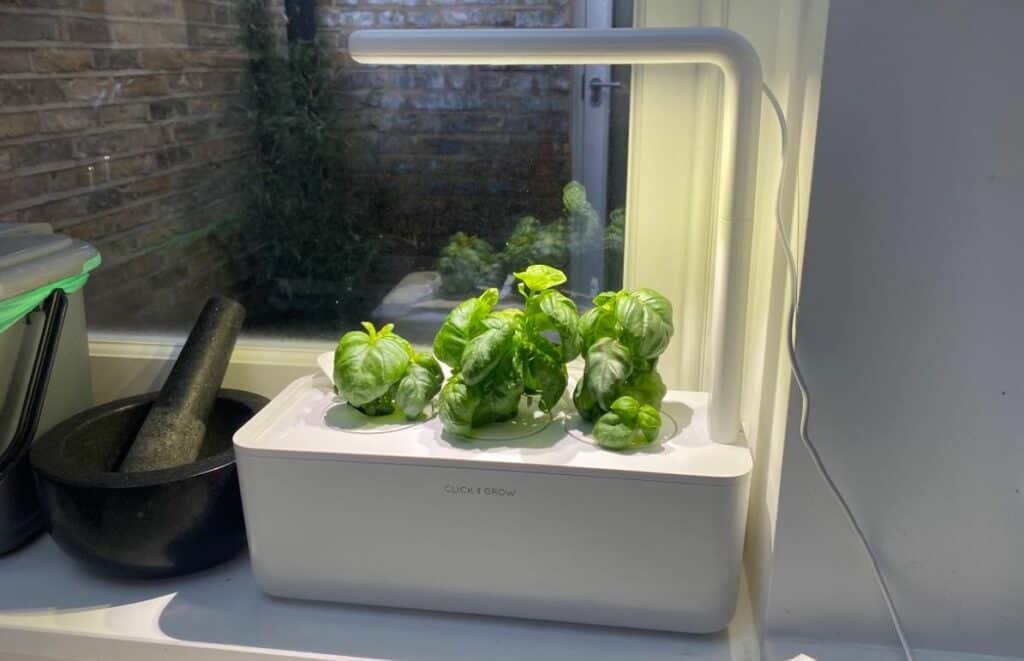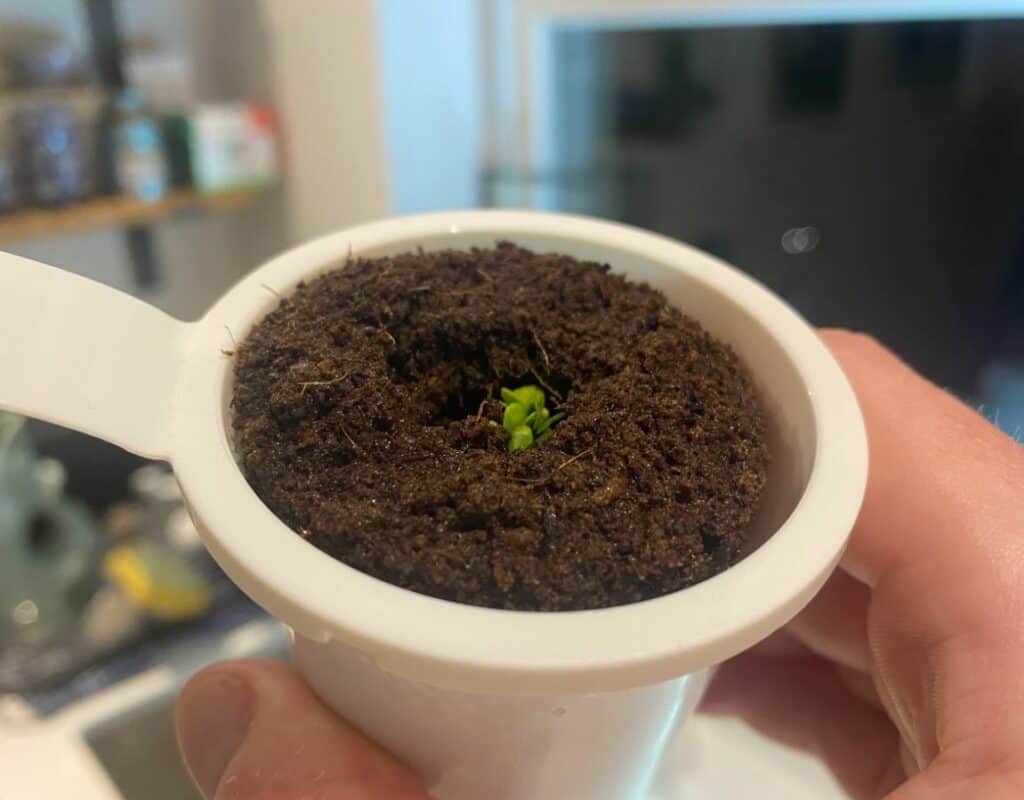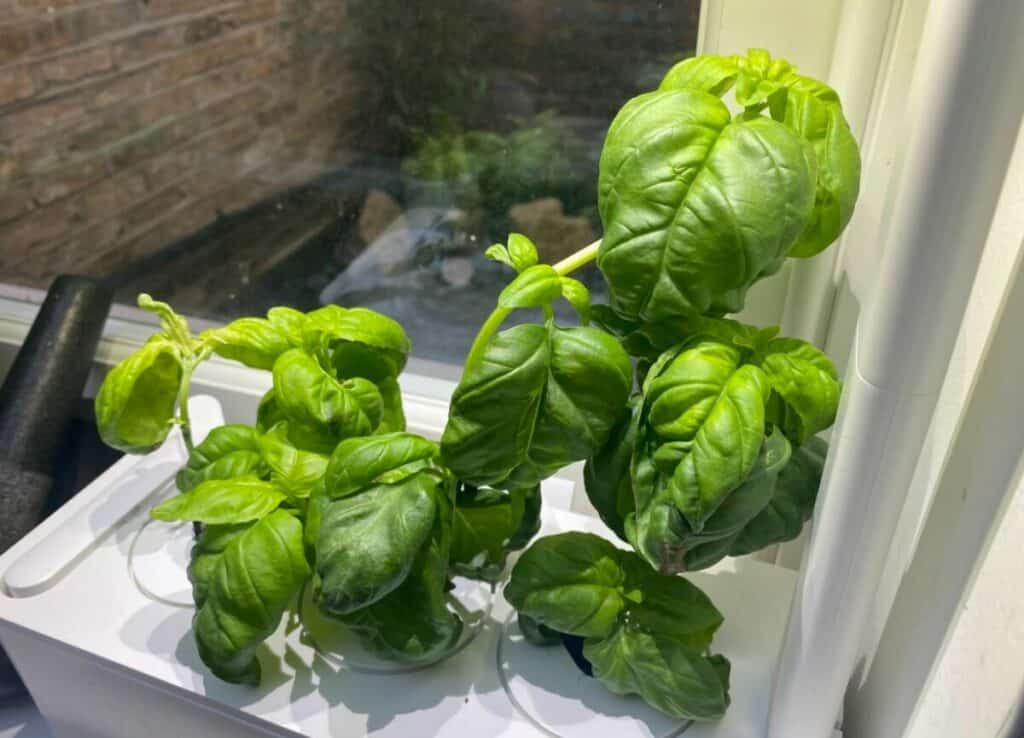This post contains affiliate links. As an Amazon Associate SmarterHomeGardens.com earns from qualifying purchases.

Basil is one of the mainstays of the culinary arts. Growing your own herbs is a wise decision, regardless of whether you want fresh herbs in pesto or marinara. If you would like to save money while also getting a faster and more reliable source of this herb, you might think about growing hydroponic basil. But how long does the plant live?
Hydroponic basil has a shorter lifespan than basil grown in soil with an average lifespan of around 4-6 months, although this can vary based on several factors. However, one of the benefits of hydroponics is that it allows for year-round growing, regardless of the weather or season.
Before we discuss this further, let’s talk a little bit about hydroponic basil.
What is Hydroponic Basil?
Hydroponic basil is a type of basil that is grown using a hydroponic system, which is a method of growing plants without soil. Instead of using soil, hydroponic systems grow plants in a growing medium like rock wool or coco coir. It uses nutrient-rich water to provide plants with the nutrients they need to grow and thrive.
The basil is grown in containers filled with an inert growing medium, such as perlite or vermiculite, and the plants are fed a nutrient solution through a drip irrigation system.
Hydroponic basil is known for its high-quality flavour and aroma, as the plants are grown in a controlled environment with optimal growing conditions. Hydroponic systems also allow for year-round growth. So it’s easy to simply start over, regardless of the weather or season. This makes it possible to enjoy fresh basil all year long.

It is easy to care for and maintain, as the plants do not require soil, and the growing conditions can be closely controlled. However, it is important to provide the plants with the proper growing conditions, including sufficient light, nutrients, and water, to ensure optimal growth and productivity.
With proper care, hydroponic basil plants can provide a steady supply of fresh, flavorful basil for your cooking needs.
How Long Does Hydroponic Basil Live?
The lifespan of a hydroponic basil plant can vary depending on a number of factors. These include the type of hydroponic system being used, the quality of the water and nutrients, and the care provided to the plants.
Basil grown via hydroponics will usually have a lifespan of between 4-6 months.
In general, basil plants grown hydroponically will have a shorter lifespan compared to those grown in soil. This is because hydroponic systems do not provide the same type of support and stability as soil, and the plants may become more susceptible to stress and damage.
However, with proper care and attention, a hydroponic basil plant can produce leaves for several months to a year or more.
Factors Affecting Hydroponic Basil Lifespan
In this section, we’ll discuss the factors that affect a hydroponic basil’s lifespan. Keep reading below!
1. Growth conditions
One of the primary factors that determine the lifespan of hydroponic basil is the growing conditions. To keep your hydroponic basil plants healthy and productive, it is important to provide them with sufficient light, nutrients, and water.
Basil plants need at least 6 hours of direct sunlight per day to grow properly, so placing your hydroponic basil in a sunny location or providing it with artificial light is important.
2. Nutrients
In terms of nutrients, hydroponic basil requires a balanced diet of macronutrients (nitrogen, phosphorus, and potassium) and micronutrients (calcium, magnesium, and sulfur).

It is important to use a nutrient solution specifically formulated for basil, as different plants have different nutrient requirements. The nutrient solution should be regularly tested to ensure that it is at the proper pH and nutrient levels for optimal growth.
3. Water
Water is also an important factor in the lifespan of hydroponic basil. Basil plants need to be watered regularly, but they should not be overwatered, as this can lead to root rot and other problems. It is important to monitor the moisture levels in the growing medium and adjust the watering schedule accordingly. Using a plug timer to automate when water flows through the system can help.
I use the timer from BD-Link (BND-60/U47), which is simple, cheap and works really well.
4. Pruning
Another factor that can affect the lifespan of hydroponic basil is pruning. Regular pruning can help promote healthy growth and prevent the plants from becoming overgrown. Pruning involves removing any yellow or wilted leaves, as well as any branches that are not producing new growth.
By regularly pruning your hydroponic basil plants, you can help to extend their lifespan and keep them healthy and productive for a longer period of time.
Caring for Your hydroponic basil
To care for your hydroponic basil plants, it is important to provide them with the proper growing conditions and follow proper maintenance practices. In this section, we’ve listed some tips to care for your hydroponic basil.
For more information about hydroponic basil care, watch this video below:
Provide sufficient light
Basil plants need at least 6 hours of direct sunlight per day to grow properly. If you are growing hydroponic basil indoors, you may need to provide artificial light using grow lights.
If you’re using an indoor smart garden like an Aerogarden or a Click & Grow then artificial grow lights should be built in. However, these lights will not last forever and will eventually need to be replaced.
Use the right nutrient solution
Hydroponic basil requires a balanced diet of macronutrients (nitrogen, phosphorus, and potassium) and micronutrients (calcium, magnesium, and sulfur). It is important to use a nutrient solution specifically formulated for basil, as different plants have different nutrient requirements. The nutrient solution should be regularly tested to ensure that it is at the proper pH and nutrient levels for optimal growth.
Monitor and adjust the moisture levels
Basil plants need to be watered regularly, but they should not be overwatered, as this can lead to root rot and other problems. It is important to monitor the moisture levels in the growing medium and adjust the watering schedule accordingly.
Prune regularly
Regular pruning can help to promote healthy growth and prevent the plants from becoming overgrown. Pruning involves removing any yellow or wilted leaves, as well as any branches that are not producing new growth. By regularly pruning your hydroponic basil plants, you can help to extend their lifespan and keep them healthy and productive for a longer period.
When pruning basil, always make sure to cut around 1cm above the leaf buds.

Monitor and control pests
Pests such as aphids and thrips can be a problem for hydroponic basil plants. It is important to regularly inspect your plants for signs of pests and take appropriate action, such as using a natural pest control method or applying a chemical pesticide if necessary.
Provide good air circulation
Hydroponic basil, along with other hydroponic plants, needs good air circulation to prevent diseases such as powdery mildew from developing. Make sure that your hydroponic system has proper ventilation, and consider using a fan to increase air circulation around the plants.
Increasing the amount of oxygen in the nutrient solution by using an air pump and air stones can also help to protect your plant and improve growth.
By following these care guidelines, you can help ensure that your hydroponic basil plants remain healthy and productive. It is also a good idea to regularly inspect your plants for signs of problems, such as yellowing leaves or wilting, and take appropriate action to address any issues as soon as possible. With proper care, your hydroponic basil plants can provide you with a steady supply of fresh, flavorful basil for your cooking needs.
Conclusion
In conclusion, the lifespan of hydroponic basil is typically 4-6 months, although this can be extended by providing the plants with the proper growing conditions and regular maintenance. By following the recommended care guidelines and regularly monitoring the plants, you can keep your hydroponic basil plants healthy and productive for an extended period and kiss goodbye to buying them in the shops.
